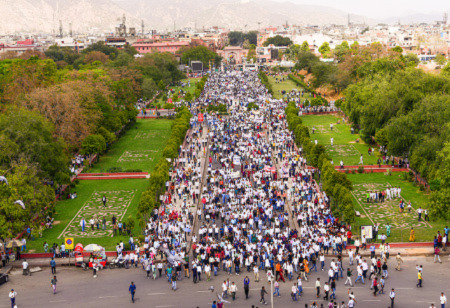
Rajasthan Passed the Right to Health Bill, but it Did Not Pass the Doctors' Requirements


A landmark bill that ensures a right to health for the 80 million residents of the northern Indian state of Rajasthan was opposed by tens of thousands of private doctors at the beginning of the month. Public hospitals were overrun with patients as a result of the protests, which decimated private healthcare providers.
The Rajasthan Right to Health Bill, which would have given citizens the legal right to get the highest quality medical care, was introduced by the state government during the recent assembly session in September. The select committee was informed about it. Private doctors in Rajasthan are waging a huge uprising against the proposed Right to Health bill of the Ashok Gehlot government.
Due to doctors' service suspensions in protest of the planned state government bill, health care in private hospitals and nursing homes in Rajasthan has been negatively impacted. However, the doctors called off the strike after the state government announced that an agreement had been reached. What is the Right to Health Bill and why is it causing a stir among doctors?
What is the Right to Health Bill?
In the year 2022, the Rajasthan Assembly heard the introduction of the right to health bill. It seeks to establish guidelines for the security and satisfaction of each person's equal rights to health and wellbeing. In other words, the government will pay the healthcare practitioner if a patient cannot afford the costs of emergency care, stabilization, or referral.
The Bill guarantees health and access to healthcare for all state citizens. This entails offering all clinical facilities' medical services to state residents without charge.
The bill obliges the state government to protect the right to health and preserve public health.
Health authorities will be established at the district and state levels. These groups will design and implement procedures for handling public health emergencies and delivering high-standard medical care.
What Does it Provide?
Right to Health: Everyone will have unlimited access to free outdoor and indoor patient departments, drugs, tests, and emergency care and treatment at any healthcare providers without having to pay in advance or get permission from the police.
Additional Rights for Residents: Ordinary Rajasthani residents will have more rights, including the ability to receive free medical care from any clinical facility as well as free transportation, medical care, and auto insurance at all healthcare facilities.
Obligations of State Government: With adequate regard for distance, geography, or population density, the state government will develop and prescribe a public health model, make the necessary allocations in the state budget, and make healthcare services accessible. To ensure an equitable allocation of healthcare professionals, the administration will also develop and legitimize a human resources policy.
Health Authorities: Separate organizations with the designations State Health Authority (SHA) and District Health Authority (DHA), respectively, will be established at the state and district levels. These organizations will create, implement, and manage the systems needed to handle public health emergencies and deliver high-quality healthcare.
The Law provides a process for handling grievances regarding denial of services and rights abuses. A 24-hour support helpline and website will be created for submitting complaints. In cases of unresolved complaints, organizations such as the State Health Authority and the Local Health Authority will be engaged.
The Bill allows Rajasthani residents to receive free medical care at any hospital or clinic. Everyone in the state has access to free outdoor and indoor patient department services, consultations, medications, and diagnostics in public health facilities, free emergency care and treatment at all healthcare providers, as well as free referral transportation provided by all healthcare facilities. All healthcare facilities offer residents free transportation, free medical care, and free insurance protection against traffic accidents. But this brings up a few problems.
What Caused the Unrest Doctors’ Protest
Non-profit analysis PRS Legislative Research points out that the Bill is ambiguous about whether the state will pay private clinical facilities for rendering these complimentary services. According to the study, this might be against Article 19(1)(g) of the Constitution, which protects the freedom to practice any profession or run any business or occupation.
A requirement for the private sector to offer inhabitants no-cost services implies that no residents would be charged any fees. The private institutions "would probably close down if the government does not reimburse the cost," it notes.
"The Bill is unclear regarding who will have access to the report on the web portal. This might violate the patient's right to privacy in medical situations, it continues.
The state's monetary strain could rise as a result of the Right to Health Act's implementation. But such additional expenses are not covered by the Bill.
While detractors contend that it disregards medical professionals' advice, is ill-prepared, and fails to take into account the actual realities of the system, a number of doctor groups in the state worry that the bill may affect medical professionals, particularly private practitioners.
The doctors believe that once the law is in place, there will be more bureaucratic interference with their ability to practice.
The doctors who are protesting the bill's adoption believe it will be an unworkable approach to healthcare, a potential burden on private institutions, and it will have little positive impact on the state's residents.
Even though a meeting was called to address the problems, the doctors' single-minded goal of repealing the RTH Act prevented it from being successful. If the Bill is not withdrawn, the medical community has warned to escalate its protest in the following days.
During this time, the majority of nursing homes and private hospitals in the state have been closed, which has resulted in a significant overflow of patients at government hospitals. Government hospital doctors also skipped work in solidarity with the protesting private practitioners.